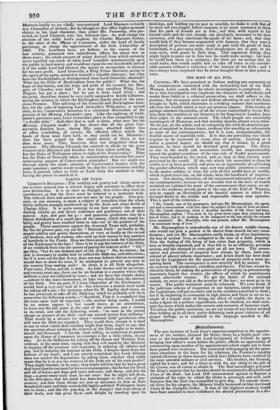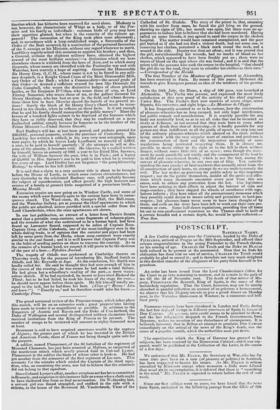The new instance of Lord Grey's rapacious nepotism in the
appoint- ment of his brother, General Sir Henry Grey, to a highly-paid sine- cure in the household of the Lord-Lieutenant of Ireland, by again bringing that officer's name before the public, affords an opportunity of commenting upon another of his appointments which ought not to have been passed over in silence. Not contented with grasping all the pecu- niary situations in the State for his relations, the Premier's cupidity extends likewise to those honours which have hitherto been confined to the most splendid military or civil services. His brother, the General, sighed for a star; and for a Grey to wish for any thing in the gift of the Crown, was of course to obtain it. The Earl accordingly procured the King's consent that his brother should be nominated a Knight Grand Cross of the Bath ; but Lord Hill remonstrated against so flagrant a violation of the rules by which the Order is governed, and with such firmness that the Earl was compelled to give way. To.console Gene- ral Grey for his chagrin, his Majesty kindly bestowed on him the Grand Cross of the Guelphic Order. A man of the slightest modesty would have been satisfied to have withdrawn his absurd pretensions to a dis- tinction which has hitherto been reserved for merit alone. Modesty is not, however, the characteristic of Whigs as a body, or of the Pre- mier and his family as individuals : common birds of prey may have their appetites glutted, but when is the voracity of the vulture ap- peased? The coronation of the King took place soon afterwards ; and, in accordance with a long-established usage, a Saturnalia of' the Order of the Bath occurred, by a nomination of the personal favourites of the Sovereign or his Minister, without any regard whatever to merit. Lord Grey eagerly seized this occasion to appoint his brother ; and thus, a General, without the slightest military fame, obtained the highest reward of the most brilliant services !—a distinction which we have elsewhere shown is withheld from the hero of Acre, and to which many Generals, whose names are identified with the Peninsular war and with Waterloo, have scarcely a hope of aspiring. General the. Honourable Sir Henry Grey, G. C. H., whose name is nat to be found in any mili- tary despatch, is a Knight Grand Cross of the Most Honourable Mili. tary Order of the Bath ; whilst a Commandery—the second grade of that Order—is deemed a sufficient reward for men like Generals Sir Colin Campbell; who wears the distinctive badges of eleven pitched battles, or Sir Benjamin D' Urban, who wears those of nine, or Lord Fitzroy Somerset, who wears those of ten, or the gallant General Sir Henry Hardinge, who has lost an arm in the field, and whose decora- tions show him to have likewise shared the laurels of ten general ac- tions! Surely the blush of Sir Henry Grey's riband must be trans- ferred to his cheeks, when be reflects on these facts. Is it not enough that be and his family should monopolize the public money? Must the heroes of a hundred fights submit to be deprived of the honours which they have so richly deserved, that they may be conferred on a mere featherbed soldier, simply because he happens to be the brother of the Prime Minister ?— United Service Gazette.
Earl Dudley's will has at last been proved, and probate granted for 350,0001., personal property, within the province of Canterbury. His Lordship has written a codicil, in his own very neat autograph, upon note paper, by which he leaves Lady Lyndhurst an annuity of 2,000/. a year, to be paid to herself quarterly : if she attempts to sell or dis- pose of the annuity, it becomes void. He likewise, by a codicil written by himself, leaves an annuity of 800/. a year to his friend Mrs. Spencer, the wife of William Spencer the poet, who is in Paris ; and a legacy of 2,5,000/. to. Mrs. Spencer's son to be paid to him when he is twenty- five years of age. Lord Dudley has not forgotten " the pamphleteering. Bishop," to whom he has left 5,0001.
It is said that a claim to a very ancient title is about to be brought before the Flouse of Lords, in which some curious circumstances, not very dissimilar to the celebrated Banbury case, will probably become the subject of consideration, and affect greatly the high honours and estates of a family at present little suspected of a precarious birth.— Morning Herald. Extensive repairs are now going on in Windsor. Castle, and some of the rooms which wereformerly open to the curious have been in conse- quence closed. The Ward-room, St. George's Hall, the Ball-room, and the Waterloo Gallery, are at present the Chief apartments to which the public are admitted, unless provided with a special order from the Lord ChamberIainovben the state apartments are shown.
In our last publication, an extract of a letter from Davis's Straits stated that a portable soup-canister, some fragments of tobacco-pipes,
and the remains of what was understood to be a -human hand, had been
found up Lancaster Sound, supposed to be „relics of Captain Ross. Captain .Grey, of the Caledonia, one of the most intelligent men in the whale-fishing trade, is of opinion that the canister and pipes had been left by some party from the Heels, whose soup-canisters were exactly similar to the one found ; and it is well known that Captain Parry was in the habit of sending parties on shore to traverse the country. As to the remains of a human hand, we suspect it will prove to be the skeleton of the paw of a bear.—Fifeshire Journal.
The tragedy of Othello was performed at Cambridge theatre on Thursday week, for the purpose of introducing Mr. Stafford Smith as Othello, and Mr. Reynolds as lago. At the conclusion, Mr. Smith was loudly called for. He said he thought they had seen enough of him in the course of the evening—he was aware be had made a total failure. He had given but a schoolboy's reading of the part—a mere water-
colour sketch. If he bad succeeded, he meant to have tried Richard the Third; but as he bad failed, be took his leave of the stage for ever—
be should never appear before them again. He felt himself totally un- equal to the task, but he had done his best. ( Cries of " Bravo I Live and learn !") " Exactly so," and he therefore would take his leave.— Cambridge Press.



















 Previous page
Previous page